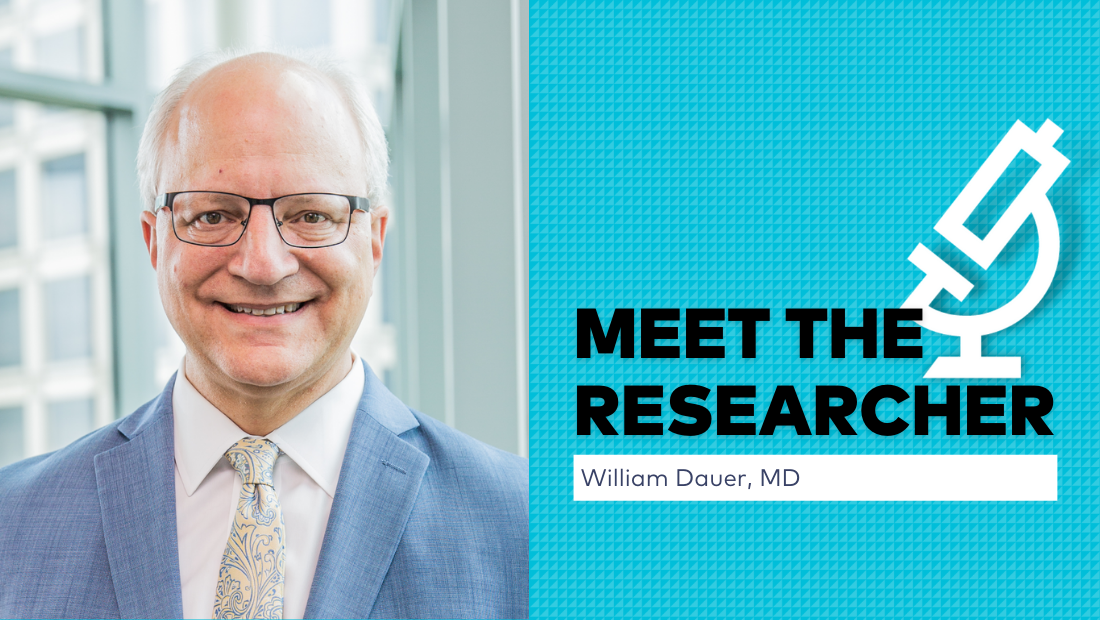How a Doctor is Removing Barriers Between Clinical Care and Research

William Dauer, MD, has had an impressive and impactful career in neuroscience. His groundbreaking research has focused on the molecular basis of dystonia (disabling, involuntary movements) and the mechanisms of neurodegeneration (lost brain cells) in Parkinson’s disease (PD).
We spoke with Dr. Dauer, who is also the inaugural Director of the Peter O’Donnell Jr. Brain Institute and Professor of Neurology and Neuroscience at the University of Texas Southwestern Medical Center, about his work, the early encouragement of the Parkinson’s Foundation funding, and his broader interests in breaking down silos between clinical care and research.
You began your career as a neurology resident and fellow in movement disorders at Columbia University more than two decades ago. How did the support from the Parkinson’s Foundation impact your early career?
It's exciting when you're just starting out to get funding. It's validating, important and so critical… those early career awards really can make a huge difference. The Parkinson's Foundation was a dominant force in enabling what my research would be, it would have been inconceivable without that support.
The Foundation funded an ecosystem of people: Bob Burke, Dave Sulzer, Serge Przedborski, Leo Stefanis. To us, as young investigators, knowing that there was some degree of support year after year and that people believed in you, it just made a world of difference. It made a lot of things possible and allowed me to do things I otherwise would not have done.
Many things in science don't work! That's part of becoming a scientist and for people who want to find the answer, that's their drive. Getting early career funding from the Foundation provides a degree of predictability and allows you to explore those ideas that are burning questions — which may be out-of-the-box thinking that wouldn’t necessarily be funded by the National Institutes of Health (NIH). It led to different things that we discovered that I think otherwise would not have been possible.
How did the Parkinson’s Foundation research grant help shape your investigations?
The Foundation was important in bolstering a basic scientific interest in PD research — it was important that they made that path possible. When I first received funding, it was the very beginning of what I would call the genetic discovery era for Parkinson's. Alpha synuclein was discovered as I was doing my fellowship: synuclein was really the first Parkinson-causing gene discovered.
The work we were able to pursue with Parkinson’s Foundation support enabled us to explore whether there was a relationship between that gene and the neurodegeneration caused by the Parkinson-related neurotoxin MPTP. These studies allowed us to discover that there is a relationship between environmental-type toxins and genetics, and that understanding provided a focus for future work. The Parkinson’s Foundation funding provided a set of questions that could be used to help guide research on synuclein itself.
All of that made a difference for me doing that work. There's a good chance I wouldn't have done that work had it not been for the early support of the Parkinson's Foundation. The Foundation support allowed me to pursue this work in an internationally recognized laboratory expert in the most cutting edge mouse genetic technologies needed to pursue these questions.
The grant fostered high quality work and the development of new science and young scientists, as I was at the time and increasing the degree of rigor and what's expected to advance the field. These things are related in ways that are hard to know. Encouraging scientists that do solid work, outstanding, rigorous work that engages and elevates the conversation, has impacts that are diffuse.
One of the most groundbreaking aspects of your career was learning about the causes of dystonia. Can you tell us about this?
Dystonia is an important symptom in Parkinson's, and it can be very disabling. It can, in some cases, be the cause for surgery and deep brain stimulation. My initial passion was dystonia for a variety of reasons, and it has been an enduring passion. The Foundation and the environment at Columbia very much contributed to this interest and, of course, also my clinical care.
The work that the Foundation initially funded was on a form of dystonia discovered at Columbia, together with researchers at Harvard, called DYT1 dystonia [a form of early onset dystonia]. The identification of a genetic form of “pure” dystonia allowed us to be able to look at this piece of the puzzle in isolation. The idea was if we can understand the mechanisms of what causes dystonia — that piece gives us a clearer picture of one of the pieces of the Parkinson disease puzzle.
What's become interesting is that by pursuing the DYT1 research we've developed evidence that dystonia is caused by abnormal functioning, and perhaps even some degree of degeneration, of a particular class of cells in the striatum [area of the brain]. The influence of that work contributed to a focus on these cells in a range of abnormal involuntary movements, including in dyskinesia and dystonia in Parkinson's. A lot of this was developed with that original funding. It's inspired others and influenced other Parkinson’s Foundation-funded investigators.
“Science and medicine are not separate, they are intertwined and nurturing that relationship, as the Parkinson’s Foundation is doing, is critical for the breakthroughs to which we all aspire.” - William Dauer, MD.
What is next for you in terms of Parkinson’s research and care?
People with Parkinson’s face a series of unique challenges. My move to UT Southwestern to direct the O’Donnell Brain Institute is an incredible opportunity to take all the scientific and clinical knowledge and experience I was so fortunate to get through places like Columbia and Michigan. I will try to bring the lessons I've learned to bear on a larger scale to tackle these diseases.
I've had this parallel career: I've always seen patients and have had this passion for rigorous research that is informed by my understanding of the illness, and also the quality of care for those with neurodegenerative disease. Creating high-level clinical care connects to the research.
When you have engaged healthcare for patients, when you're doing the right thing, they come back because you're taking care of them and educating their families. That leads them to become advocates for research, and in some cases to participate directly in patient-centered research. Science and medicine are not separate, they are intertwined and nurturing that relationship, as the Parkinson’s Foundation is doing, is critical for the breakthroughs to which we all aspire.
Learn more about Parkinson’s Foundation research at Parkinson.org/Research.
Related Blog Posts

Mapping the Brain in High Resolution: How the University of Michigan is Advancing Parkinson’s Neuroscience

Top Parkinson’s Science News Articles of 2025
